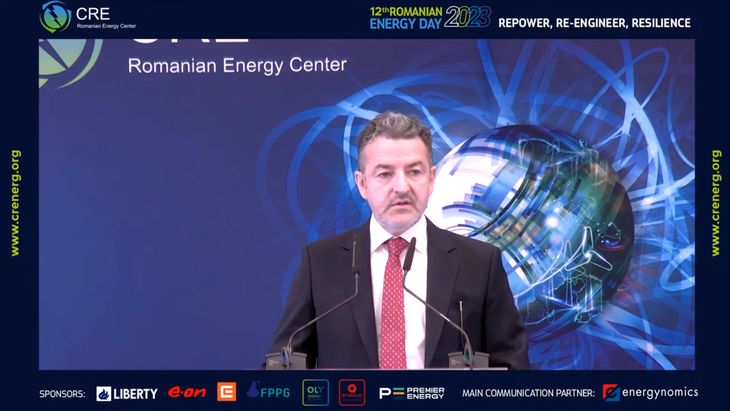Major business leaders and key authorities from all over Europe gathered on Tuesday in Brussels for the 12th edition of Romanian Energy Day, organized by the Romanian Energy Center (CRE), which had Energynomics as the main media partner.
”We live in times of poly-crisis. We are so close to missing the 1.5C target. We are in the middle of a conflict at the border of the EU, with a strong energetic impact. We also have a lot of fights within the EU. There are countries that want to stay in the past, countries that want to push for the future, so we discuss a lot…We have many challenges, crises and topics to discuss….That’s why we meet: we have to build a sustainable infrastructure. We also need to re-affirm that we will support democracy and the rule of law,…our strong commitment to fight climate change. That’s why it is important to organize these meetings,” said Corneliu Bodea, president of the Romanian Energy Center.
”Just the fact that we are here in this room re-affirms our strong commitments towards the targets,” he added.
In his turn, Victor Negrescu, a member of the European Parliament, also said that many challenges remain, even if the main issues of the crisis passed.
”We just finished the year with significant challenges: we had to reduce our dependency on Russia while maintaining the prices with adequate costs, while at the same time increasing investments. We did it, contrary to all expectations,” said Negrescu.
”It wasn’t easy and generated a lot of costs. There were industries that suffered a lot due to higher costs. However, despite difficulties, decision-makers around Europe understood that the energy sector requires more support, more investments, more strategic approach and, in the same time, that we need to plan ahead”, added Negrescu.
Last year has been very challenging from the perspective of energy price changes, also said Ioan Pogea, Head of the TTE Unit & Energy Counsellor, Permanent Representation of Romania to the European Union.
“Member states had to quickly adapt to the crisis. There have been expectations from Brussels from the regulators to quickly provide tools. We have been last year negotiating more than five emergency regulations in a time record. Usually, regulations Directives take up to two years, but last year energy ministers met more than eight times in council formation during the Czech presidency, so in six months we had extraordinary council meetings”, Ioan Pogea added.
This energy crisis brought together energy ministers and when dealt with a common challenge, they managed in a very short time to bridge the differences.
“We adopted the gas demand reduction regulation. Then we went up to the October emergency regulation, with a different set of rules when it comes to pick hours, the famous infra-marginal cap revenues and the solidarity tax for fossil fuel companies. Then we adopted the solidarity regulation that proved to be the legal basis for the EU energy platform for joint gas purchasing. It’s not easy, it has been a challenging process to design the platform…Then we had the market correction mechanism…Now we are facing the energy market reform…We are positive to promote PPAs and CfDs,” said Ioan Pogea, exemplifying more legal aspects now undergoing in Brussels and affecting Romania.

